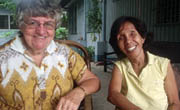Womb of God
By Sr. Mary Gauthier, O.L.M.
May/June 2010
Return to Table of Contents
Print Article
Recently I had the privilege of journeying on a retreat with the staff of Sabakan, which in the local dialect of Cebuano means “womb.” Seeing the needs of abused women and children, the Christian community of Pagadian City responded with the creation of this training and resource centre offering free legal aid to indigent clients. The centre promotes and protects the human rights of women and children using creative methodologies. Since its beginnings in 1997, services have grown to include Gender Sensitivity Training, Prevention Education against Child Abuse, Understanding Psychosocial and Psychosexual Development, and many other types of service. Sabakan also specifically encourages and facilitates dialogue between women of different faiths.
 (Credit: Anie Montejo, O.L.M.)
(Credit: Anie Montejo, O.L.M.)Sr. Mary Gauthier and Dading Colon enjoy friendship in the Philippines.
Even as they serve, the staff is very aware of their own need for prayer and their dependence on a creative, loving God. Listening to their sharing while on retreat gave me a glimpse of a group of people who are also sensitive to the needs of their clients. Inday Yap, the coordinator at Sabakan, says that in their experience, a male image of God has a negative impact on those who have been abused because it so often connotes fear, dominance and power. Rather, the staff asked themselves how they could bring forth an image of a loving God, a God who empowers those who have felt so very powerless at the time of abuse.
Inday also explains that those who have already gone through the heal ing process often become volunteers who in turn share their experience with others. This can be very powerful. At one of the meetings someone asked, “How do you know you are healed?” The volunteer replied, “If I weren’t healed I wouldn’t be able to stand in front of all of you to tell my story.”
At times, the staff goes out to parishes and schools to raise awareness. There they encourage students to tell their stories while everyone listens with respect. As a result, the students are able to say with pride, “Our stories have become sacred.” This helps them to really believe that they are special children of God.
This is why I feel so privileged to have accompanied the staff of Sabakan on their retreat. I have seen and heard how they listen to hear the voice of God in their own hearts so as to find the strength and courage to listen well and to truly hear the voice of the abuse survivor. Listening to their stories of struggle and growth has strengthened me to continue to walk in faith and to trust in a loving, compassionate God.
As those who are in the healing process begin to say, “God is with us, in us, around us and beside us. Why should we fear? Our power is within,” it is evident that Sabakan does indeed live up to its name, “womb,” a place of new life and new possibilities. This can be an invitation to us all as we live and work for the Reign of God in our diverse societies. It can also be an invitation for us to care for our Earth, the very Womb of God.
Return to Table of Contents
Print Article